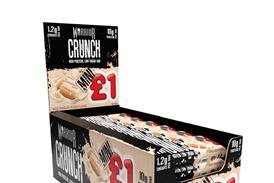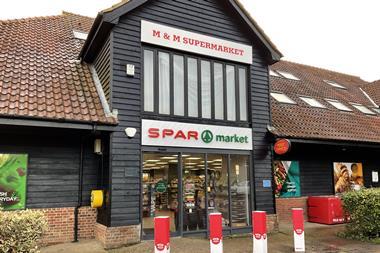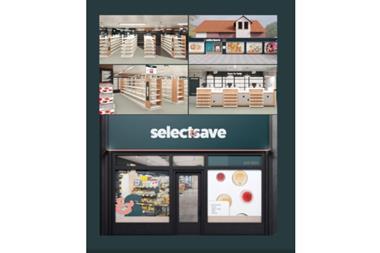Booker's recovery plan is all about range, price and service. David Rees investigates
To say that Booker has gone through some ups and downs in recent years would be something of an understatement. But now a new management team hopes to push through a plan with the ambitious aim of making it the "biggest and best" supplier to small businesses in the UK.
The recovery strategy, led by chief executive Charles Wilson, is in three stages labelled focus, drive and broaden.
The focus stage hinged on reorganising and simplifying the business, with a particular focus on the basics of wholesaling - stock management and cashflow.
And, from the outside at least, it looks to have been successful, as the company's net debt has been reduced from a horrifying £361m in September 2005 to about £79m today.
The second phase - drive - is now well under way, inspired by the new Booker mantra of 'choice up, prices down, better service'.
The idea behind 'choice up' is to offer a better constructed range to cover all angles in the market without too much duplication. Ranges are being built around discount, mid-price and premium offerings, with the 'broaden' part of the plan seeing an increasing variety of top-quality food brands and Fairtrade lines being introduced.
In some product groups, for example Champagne, Booker is bidding to 'own' the category with the best possible range and prices, and here sales are 33% up. It is also introducing hundreds of speciality items such as Polish foods for new and growing communities, and is pushing for more choice in pack sizes, flavours and pricemarked options within the brands that are being retained.
Ah yes, many lines have been cut from the Booker manifest. As part of the 'focus' phase, items that hadn't been sold within 12 weeks were identified as dead stock and discontinued. In one of Booker's flagship depots at Billing, Northampton, this amounted to 800 lines, which created space for 84 new pallet bays. This in turn enabled a lot more pallet merchandising for key lines such as Smirnoff vodka, improving both the efficiency of operation and product availability, which is now running at 99%, the best in Booker's recent history.
A further simple innovation has been to give 300 or so products green price tickets in-depot, signifying them as 'must stock' lines for retailers and flagging them up as priorities for depot staff to replenish.
Booker has also taken steps to improve its offer in some of the more difficult growth areas.
The company has recently invested £3.5m in new delivery vans, including multi-temperature vehicles, meaning that soon every branch will be able to offer fresh and chilled deliveries picked from the depot, backing up the existing Booker Fresh drop shipment service run in partnership with Kerry Foods.
Booker has also seen a 50% increase in fruit and veg sales since switching from a national supply line to a regionally based sourcing network of 14 local markets. It's also been running local sourcing trials in Kent, working with small suppliers of chutneys, cakes, fruit juices and water, and dipped its toe into some bulkier non-food, with garden furniture and patio heaters available to sell to shoppers via a leaflet - one Premier retailer sold 13 sets this way.
And as the 'broaden' phase develops, Booker will work towards its stated goal of being "the UK's biggest and best supplier to small businesses, and to be manufacturers' preferred route to market in the UK".
So, what about the retailers? This is where Steve Fox comes in.
As director of retail and Premier development, Fox looks after the pyramid of customers comprising 2,000 Premier symbol group stores, 2,000 Retail Club members and about 70,000 other retailers who shop regularly with Booker.
Costs in the industry are rising, so retailers have to look at ways of growing their bottom line," says Fox. "Our members invest a lot of money in their stores, we are all about adding value."
Booker's like-for-like sales to retailers are increasing once more, having slipped into decline at the low point of Booker's fortunes, with the Premier tier up by 17% year on year, which includes organic growth as well as the effect of about 300 new retailers joining the group.
And the improved Booker operation has undoubtedly helped to attract bigger retail accounts to Premier. In the past year more than 100 retailers have joined from other symbol groups and just recently Thames Petroleum in Scotland added its seven-store estate to the network.
Fox stresses that Premier allows retailers to run their own business within certain disciplines - and the retailers who don't follow the disciplines won't be allowed to remain.
About 175 retailers have been asked to leave the group, mainly for not supporting promotions properly. "But we haven't necessarily lost them as Booker customers," says Fox.
He continues: "Statistics show Premier has the best compliance to promotions in the independent sector, and in return we get great support from suppliers."
Fox illustrates this point with an exclusive scratchcard for Premier retailers, offering prizes of Sky+ TV packages and iPod Shuffle to accompany the launch of Mars Planets.
"Customers told us that we weren't quick with product launches, whereas now we are first to market. I work much more closely with the trading department than I used to, and we are focused on being a buying and selling organisation."
And Fox can certainly do a good sales job when it comes to the company's symbol group. "We say this about Premier: it will make you more bottom-line profit," he enthuses. "There are no joining fees, and your cost of goods will be cheaper - typically £15,000-£20,000 a year cheaper - than in other symbol groups.
"We have 100 people in our sales force, half of whom are retail development managers to work with store owners. We have a team of merchandisers to help new recruits, and work with the Retail Plus agency to offer retail training where needed.
"We also have 172 branches within easy reach, and even if the local branch doesn't stock something you can order it, with about 20,000 lines available in total.
"Premier comes out best for availability in the CTP awards, and our branch network is the main reason why."
Most symbol group bosses shy away from playing the numbers game, and Fox is no exception. "The important bit for us is getting the right retailer," he says. "We want quality retailers, entrepreneurs who will work with in partnership with us to grow their businesses. We would like them to think in terms of choice, price and service as well."
And the retail verdict? In researching this article, C-Store contacted some retailers informally to get a ground-level view of the new Booker.
All had noticed an improvement, particularly in availability and the general efficiency of operation, but some felt ranges and prices were moving in the wrong direction, and most remain wary about the company's future strategy.
But the road to recovery is a long and winding one, and Booker still has time to turn all its negatives into positives.
Ken and Margaret Banfield run Embankment Stores, just over the road from Booker's head office in Wellingborough, Northamptonshire. Perhaps not surprisingly considering their location, they've always had plenty of advice
from Booker.
"We took over the shop three-and-a-half years ago, and talked to Booker at that stage about signage, layout and running a store in general," says Ken. "We had no retail experience - I'd worked in insurance for 30 years - so we relied on advice to get us started.
"Within 9-12 months we had joined the Retail Club and got into the routine of going to the cash and carry, running promotions and using the leaflets.
"We've been in Premier since September 2006. Initially, we just wanted to expand the living quarters but what started out as a loft conversion ended up as a full shop expansion. Booker helped us to find shopfitters, and had a lot of input regarding the outside of the premises, too. We put in a new counter and new stock, and merchandisers came in to help us set it all up. Booker even stored our stock at the cash and carry while we had the builders in.
"When we launched, Booker helped us with special deals and raffle prizes for the opening, and sales in our first week were up by £3,000. Since we joined Premier we've seen a step change - we thought we were doing well before, but sales are up 35%, and the store is nothing like the one we bought.
"We were keen to learn and listened to Booker, and the same advice could have cost us a fortune from a consultant. For example, I'd never considered that our shop should stock Champagne or large bottles of spirits, but Booker persuaded us to give them a try and now we sell about four bottles of Champagne a day."
To say that Booker has gone through some ups and downs in recent years would be something of an understatement. But now a new management team hopes to push through a plan with the ambitious aim of making it the "biggest and best" supplier to small businesses in the UK.
The recovery strategy, led by chief executive Charles Wilson, is in three stages labelled focus, drive and broaden.
The focus stage hinged on reorganising and simplifying the business, with a particular focus on the basics of wholesaling - stock management and cashflow.
And, from the outside at least, it looks to have been successful, as the company's net debt has been reduced from a horrifying £361m in September 2005 to about £79m today.
The second phase - drive - is now well under way, inspired by the new Booker mantra of 'choice up, prices down, better service'.
The idea behind 'choice up' is to offer a better constructed range to cover all angles in the market without too much duplication. Ranges are being built around discount, mid-price and premium offerings, with the 'broaden' part of the plan seeing an increasing variety of top-quality food brands and Fairtrade lines being introduced.
In some product groups, for example Champagne, Booker is bidding to 'own' the category with the best possible range and prices, and here sales are 33% up. It is also introducing hundreds of speciality items such as Polish foods for new and growing communities, and is pushing for more choice in pack sizes, flavours and pricemarked options within the brands that are being retained.
Ah yes, many lines have been cut from the Booker manifest. As part of the 'focus' phase, items that hadn't been sold within 12 weeks were identified as dead stock and discontinued. In one of Booker's flagship depots at Billing, Northampton, this amounted to 800 lines, which created space for 84 new pallet bays. This in turn enabled a lot more pallet merchandising for key lines such as Smirnoff vodka, improving both the efficiency of operation and product availability, which is now running at 99%, the best in Booker's recent history.
A further simple innovation has been to give 300 or so products green price tickets in-depot, signifying them as 'must stock' lines for retailers and flagging them up as priorities for depot staff to replenish.
Booker has also taken steps to improve its offer in some of the more difficult growth areas.
The company has recently invested £3.5m in new delivery vans, including multi-temperature vehicles, meaning that soon every branch will be able to offer fresh and chilled deliveries picked from the depot, backing up the existing Booker Fresh drop shipment service run in partnership with Kerry Foods.
Booker has also seen a 50% increase in fruit and veg sales since switching from a national supply line to a regionally based sourcing network of 14 local markets. It's also been running local sourcing trials in Kent, working with small suppliers of chutneys, cakes, fruit juices and water, and dipped its toe into some bulkier non-food, with garden furniture and patio heaters available to sell to shoppers via a leaflet - one Premier retailer sold 13 sets this way.
And as the 'broaden' phase develops, Booker will work towards its stated goal of being "the UK's biggest and best supplier to small businesses, and to be manufacturers' preferred route to market in the UK".
So, what about the retailers? This is where Steve Fox comes in.
As director of retail and Premier development, Fox looks after the pyramid of customers comprising 2,000 Premier symbol group stores, 2,000 Retail Club members and about 70,000 other retailers who shop regularly with Booker.
Costs in the industry are rising, so retailers have to look at ways of growing their bottom line," says Fox. "Our members invest a lot of money in their stores, we are all about adding value."
Booker's like-for-like sales to retailers are increasing once more, having slipped into decline at the low point of Booker's fortunes, with the Premier tier up by 17% year on year, which includes organic growth as well as the effect of about 300 new retailers joining the group.
And the improved Booker operation has undoubtedly helped to attract bigger retail accounts to Premier. In the past year more than 100 retailers have joined from other symbol groups and just recently Thames Petroleum in Scotland added its seven-store estate to the network.
Fox stresses that Premier allows retailers to run their own business within certain disciplines - and the retailers who don't follow the disciplines won't be allowed to remain.
About 175 retailers have been asked to leave the group, mainly for not supporting promotions properly. "But we haven't necessarily lost them as Booker customers," says Fox.
He continues: "Statistics show Premier has the best compliance to promotions in the independent sector, and in return we get great support from suppliers."
Fox illustrates this point with an exclusive scratchcard for Premier retailers, offering prizes of Sky+ TV packages and iPod Shuffle to accompany the launch of Mars Planets.
"Customers told us that we weren't quick with product launches, whereas now we are first to market. I work much more closely with the trading department than I used to, and we are focused on being a buying and selling organisation."
And Fox can certainly do a good sales job when it comes to the company's symbol group. "We say this about Premier: it will make you more bottom-line profit," he enthuses. "There are no joining fees, and your cost of goods will be cheaper - typically £15,000-£20,000 a year cheaper - than in other symbol groups.
"We have 100 people in our sales force, half of whom are retail development managers to work with store owners. We have a team of merchandisers to help new recruits, and work with the Retail Plus agency to offer retail training where needed.
"We also have 172 branches within easy reach, and even if the local branch doesn't stock something you can order it, with about 20,000 lines available in total.
"Premier comes out best for availability in the CTP awards, and our branch network is the main reason why."
Most symbol group bosses shy away from playing the numbers game, and Fox is no exception. "The important bit for us is getting the right retailer," he says. "We want quality retailers, entrepreneurs who will work with in partnership with us to grow their businesses. We would like them to think in terms of choice, price and service as well."
And the retail verdict? In researching this article, C-Store contacted some retailers informally to get a ground-level view of the new Booker.
All had noticed an improvement, particularly in availability and the general efficiency of operation, but some felt ranges and prices were moving in the wrong direction, and most remain wary about the company's future strategy.
But the road to recovery is a long and winding one, and Booker still has time to turn all its negatives into positives.
Good neighbours
Ken and Margaret Banfield run Embankment Stores, just over the road from Booker's head office in Wellingborough, Northamptonshire. Perhaps not surprisingly considering their location, they've always had plenty of advice
from Booker.
"We took over the shop three-and-a-half years ago, and talked to Booker at that stage about signage, layout and running a store in general," says Ken. "We had no retail experience - I'd worked in insurance for 30 years - so we relied on advice to get us started.
"Within 9-12 months we had joined the Retail Club and got into the routine of going to the cash and carry, running promotions and using the leaflets.
"We've been in Premier since September 2006. Initially, we just wanted to expand the living quarters but what started out as a loft conversion ended up as a full shop expansion. Booker helped us to find shopfitters, and had a lot of input regarding the outside of the premises, too. We put in a new counter and new stock, and merchandisers came in to help us set it all up. Booker even stored our stock at the cash and carry while we had the builders in.
"When we launched, Booker helped us with special deals and raffle prizes for the opening, and sales in our first week were up by £3,000. Since we joined Premier we've seen a step change - we thought we were doing well before, but sales are up 35%, and the store is nothing like the one we bought.
"We were keen to learn and listened to Booker, and the same advice could have cost us a fortune from a consultant. For example, I'd never considered that our shop should stock Champagne or large bottles of spirits, but Booker persuaded us to give them a try and now we sell about four bottles of Champagne a day."


















No comments yet